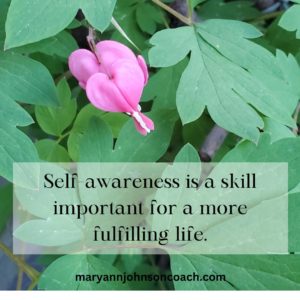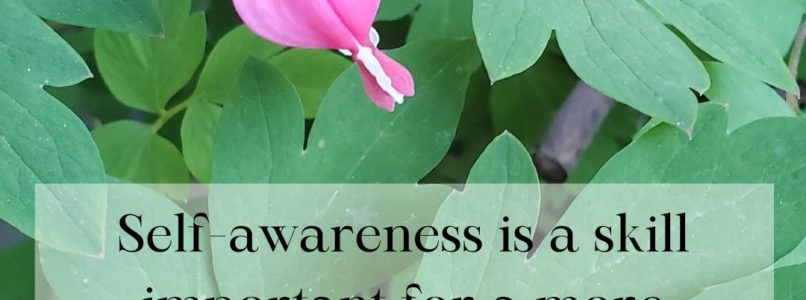 Last spring, I was listening to a talk at church and the speaker gave a statistic that I found intriguing and a bit surprising. He said that most people think they are self-aware but that when tested only about 15% are. That is a low number of people who really know where they are emotionally, at any given time.
Last spring, I was listening to a talk at church and the speaker gave a statistic that I found intriguing and a bit surprising. He said that most people think they are self-aware but that when tested only about 15% are. That is a low number of people who really know where they are emotionally, at any given time.
You are probably not surprised that this information would catch my eye. After all, I did a little counseling for myself this year because I knew there were issues with my self-awareness which made it difficult to manage triggers and stress.
What does being self-aware look like?
John Duffy, a clinical psychologist and author, expressed it this way – “In effect, self-awareness is the recognition of one’s own emotional state at any given point in time…To the degree that we can manage our emotional states, we are better able to manage…other elements of our lives as well.”
Amy McManus, a marriage and family therapist, describes self-awareness this way – “Self-awareness is the ability to look at your own words and actions from a perspective outside of yourself; to see yourself as others see you.”
Can you see how helpful it would be to be able to see yourself as others see you and then choose how to respond rather than being triggered or feeling less than? Can you see how empowering it is to be aware of your current emotional state so that you could take steps to manage how you feel?
This information was helpful for me last spring when I could see that I was on the edge of a cliff. My emotional state was in disarray after almost five years of full-time caregiving, and I needed help so that I could continue to manage.
As a mom, co-worker, wife, neighbor, etc. we would all do better if we could recognize our current emotional state, accept it, not feel like a loser if it is in disarray, and then do something to get back on track.
This is what I did last spring, got help, so I could work on getting my emotional state back into a place where I could manage myself and continue to care for those I love.
We tend to think we’re self-aware when we’re not. Remember those statistics – only 15% of the population is self-aware most of the time. Katie Krimer, a licensed clinical social worker, said that many people “feel that they know and understand themselves much better than they actually do. They may even have avoided building self-awareness because it involves looking at oneself as honestly as possible, and this can often invoke feelings of shame that can be difficult to handle.”
In my opinion and experience, to become more self-aware we need first, to give up shame because there are times you are not in a good place. This frees us to seek whatever help we need, to put ourselves back in order. If we are ashamed that we aren’t ‘perfect’ then we will shut down, hide from ourselves, and not seek help. As you can tell from the statistics, that is the choice many make whether intentionally or unintentionally.
Self-awareness is a skill important for a more fulfilling life
Self-awareness is important for a fulfilling life, one is freer from triggers, and feelings of shame, and able to respond more often rather than react.
Here is another bit of wisdom from John Duffy – “If you can manage your own emotions, you are more than likely able to exert an impact on the emotional vibe of a family, a work situation, or a social encounter. All of that is to say, self-awareness can be incredibly useful in driving a more aware, fulfilled life.”
The cool thing about a skill and self-awareness is a skill, is that it can be learned and mastered. It isn’t a natural talent so anyone can be better at self-awareness.
Last year when I was on a Mother’s Day retreat my daughter, Jodie, stopped by. She was helping me, so that I would be free to stay by myself for a few days, doing what I wanted. We didn’t plan it, but when she got to where I was staying, I spent an hour talking with her about the state of my emotions, and where I really was. It wasn’t comfortable because I am the mom, a writer, a mentor, and I should have all my ducks in a row, right? But it was helpful.
We strategized a few things that would help me physically manage better at home, as well as emotionally. In order for this conversation to occur I had to be willing to accept that I am not perfect, I do have ‘stuff’, and that it is OK. It doesn’t diminish my worth or my ability to help and serve others. In fact, that conversation allowed me to serve better, going forward. All those months ago, it was worth being vulnerable so that I could receive help to see what I needed to do. As has been said, self-awareness is a skill for a more fulfilling life.
So how can we cultivate greater and more consistent self-awareness?
I read several articles on this topic because, like most of you, I wasn’t sure how to cultivate self-awareness. I know that I can be self-aware, but I also know there are times I avoid it.
As I read there was a plethora of thoughts on how to cultivate self-awareness. I have chosen, for myself, only those that I am currently willing and/or able to do. As you do your own research you will see many other ideas and then you can choose what will work for you right now. I am sharing the link to one article I read and one talk I listened to, to get you started.
Here Is What I Committed To
1. Seek feedback from those you trust. That is what I was doing with my daughter on my Mother’s Day retreat. It is what I did when I chose to do some work with a professional counselor last spring.
2. Practice gratitude. This is a long-term practice for me. I have filled several gratitude journals. I write three things daily. My goal has been to not repeat myself. That is a challenge. : ) I will continue this practice.
This week I began a new gratitude journal after two years of writing. I still strive to write down new things. I am not above writing down eggs, watermelon, my mom can still dress herself, or cereal for an easy breakfast. LOL
This one practice has been helpful on many levels, not just with self-awareness. I recommend it highly!
3. Examine your triggers. Recently, I was on a wonderful podcast called Beyond the Cookie Cutter. In that podcast, I talked about a moment when I was triggered by something my husband did. Mary Black, the host asked me to explain how I worked through the situation to determine what the trigger was so I could get my emotions back in order. You may find my experience of use as you figure out how to do this yourself.
4. Let your walls down. This goes along with number 1. You do this best with those you trust. As I shared in the podcast, my husband can trigger me. But of all the people in the world, I trust him most. So, we have talked about it. He knows I am continuing my work to heal my triggers, which aren’t about him at all. He is being patient. : )
5. Look in the mirror-literally. I have been looking in the mirror at myself for years. I have aged considerably in the past five years, since becoming a full-time caregiver. However, aged or not, I like looking at myself in the mirror, even on days I am mad at myself because of a choice, a behavior, or a lack of self-management, etc. With much practice, I have learned my value and I love myself. This is a skill I have mastered! P.S. This is probably one of the reasons I am free to be vulnerable with those I trust and with you, my readers. My love for me isn’t dependent on how I look or any state of perfection.
When I look in the mirror it has been to tell myself how good I am as a person and to give myself some love. As was said in the NBC News article – to learn to track attention and emotions and gain new insights into how thoughts are affecting in real time — this sort of mimics face-to-face conversations that involve deep listening and being fully present with another person.” I plan to be deeply present with myself for a few moments on a regular basis and to continue to look in the mirror and tell myself how much I am loved!
So, look in the mirror and love the woman you see looking back with all her imperfections, disappointments, sadness, etc. Know that she is of worth and that you are moving her forward.
I have shared with you what I am currently willing to do to be more self-aware. However, there are many other possibilities. Check out the other ideas for yourself and choose what you can commit to.
Becoming self-aware is life changing and it is a skill we can master!
P.S. Mediation came up often on the lists. I have meditated in the past but right now, I can’t commit to it. However, it was powerful for me a decade ago and there is a wonderful TED talk on meditation and self-awareness. You may be ready to commit to this. If so listen HERE. I was so taken by this talk that I may reconsider and commit myself. : ) It was beautiful, simple, and doable. Pondering my options. : ) Here is a good article to get you started on your own search for greater self-awareness. What is Self-awareness? And how can you cultivate it?

